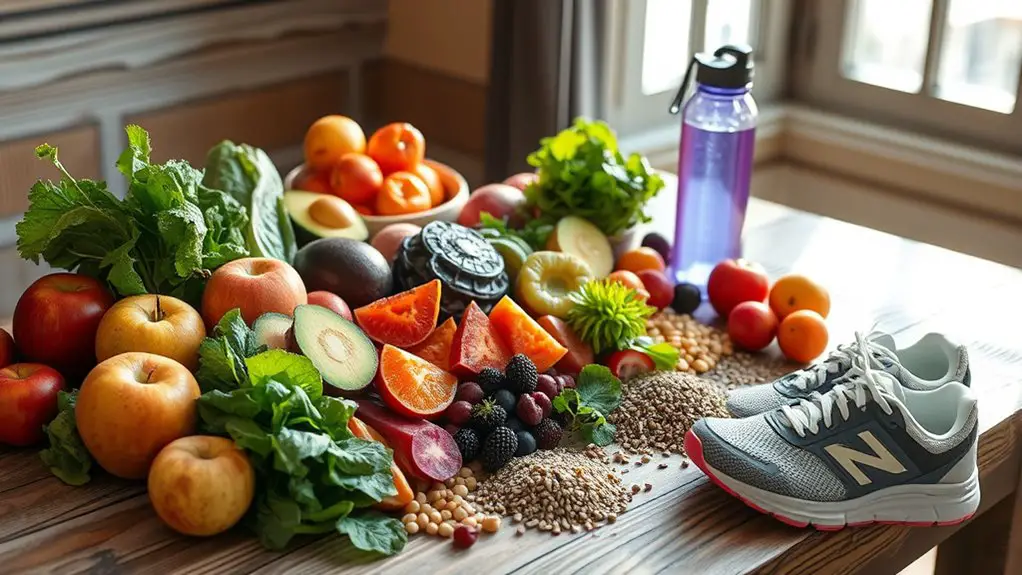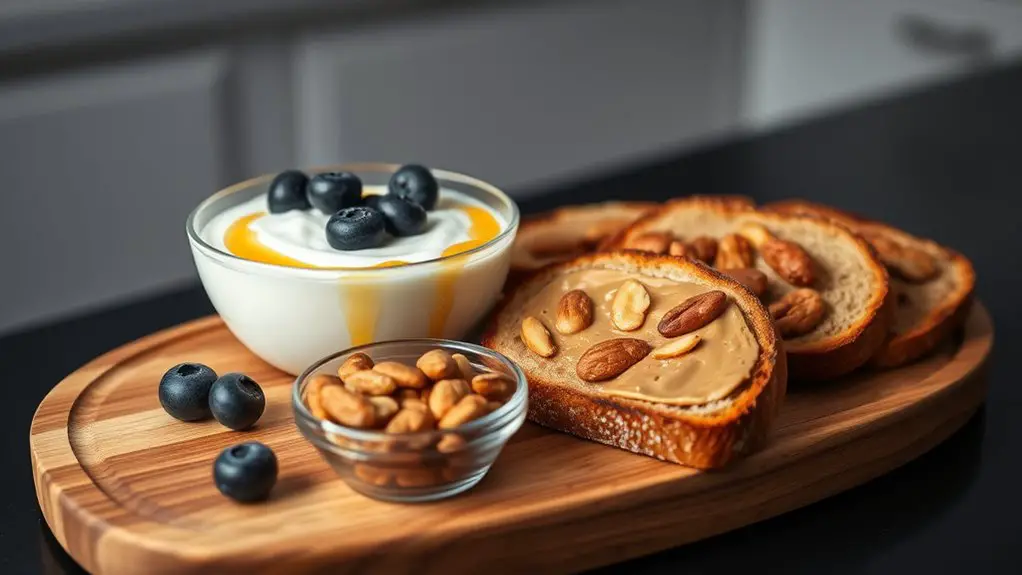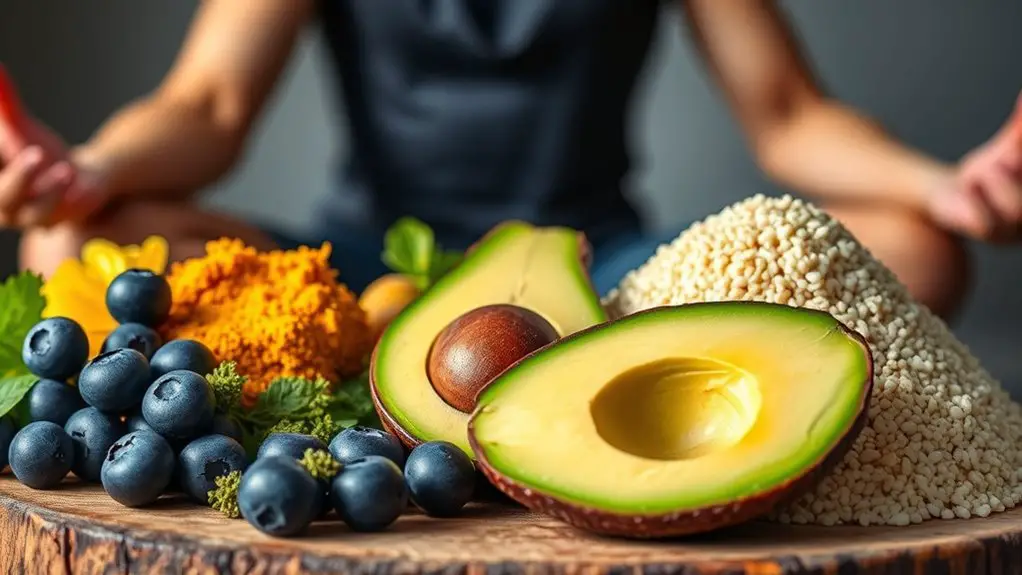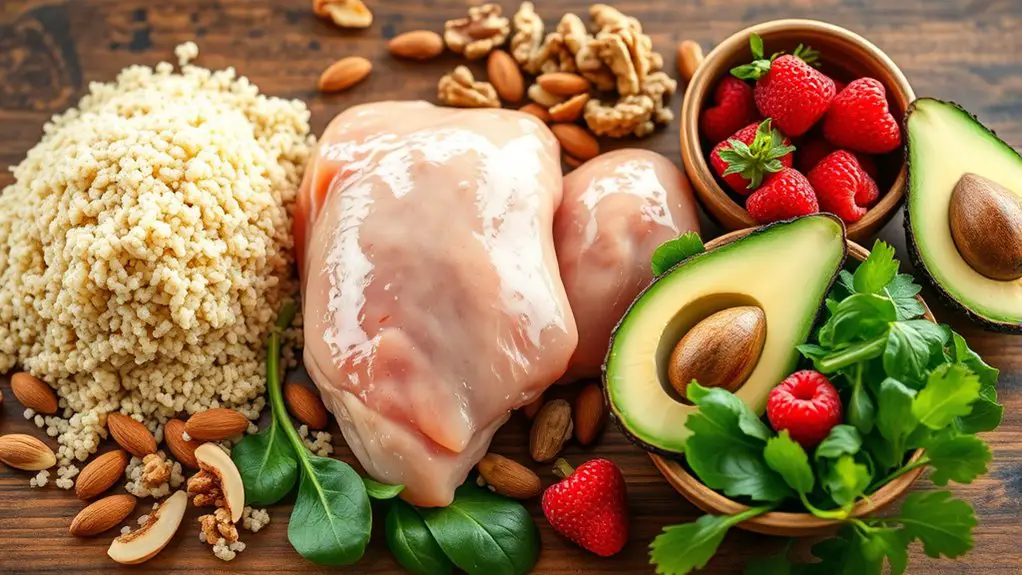Fiber's essential for athletic digestion because it promotes smooth digestive function and aids in nutrient absorption. It regulates blood sugar levels, providing steady energy during workouts and improving endurance. By helping you feel full, fiber also supports weight management, which is vital for performance. To maximize your athletic potential, striking the right balance with fiber is key. If you want to know more about how to incorporate fiber effectively, there are some great tips ahead.
The Role of Fiber in Digestive Health
When it comes to maintaining ideal digestive health, fiber plays an essential role that shouldn't be overlooked. You might not realize it, but fiber's benefits extend far beyond just regularity. It helps your digestive system function smoothly, allowing you to feel light and energetic—perfect for your active lifestyle. By incorporating adequate fiber into your diet, you can reduce the risk of digestive discomfort and promote gut health, giving you the freedom to push your limits without worrying about what you ate.
Fiber also aids in nutrient absorption, which is crucial for fueling your workouts and recovery. It keeps you feeling full, so you can resist the urge to snack mindlessly, keeping your energy levels stable. Embracing fiber isn't just about physical health; it's about empowering your body to perform at its best, giving you the confidence to chase your athletic goals without hesitation.
Types of Fiber: Soluble vs. Insoluble
Understanding the types of fiber—soluble and insoluble—can greatly impact your athletic performance and digestive health. Soluble fiber dissolves in water, forming a gel-like substance that can help slow digestion. This can be beneficial for maintaining steady energy levels during your workouts, as it helps regulate blood sugar levels. You can find soluble fiber in foods like oats, beans, and fruits.
On the other hand, insoluble fiber doesn't dissolve in water and adds bulk to your stool, promoting regular bowel movements. It keeps your digestive system running smoothly, which is vital for athletes who need to feel light and agile. Whole grains, nuts, and vegetables are excellent sources of insoluble fiber.
Incorporating both types into your diet supports ideal digestion, allowing you to focus on what you love—your sport—without the distraction of digestive discomfort. Embrace this fiber balance for freedom in your athletic journey!
How Fiber Affects Nutrient Absorption
Although fiber is crucial for digestive health, it can also play a significant role in how well your body absorbs nutrients. When you consume fiber, particularly soluble fiber, it forms a gel-like substance in your gut. This gel can slow down digestion, allowing your body more time to break down food and absorb important vitamins and minerals.
However, this can be a double-edged sword. If you consume too much fiber too quickly, it might interfere with the absorption of certain nutrients, like iron and calcium. It's all about balance. By incorporating fiber gradually, you can optimize your nutrient intake without overwhelming your digestive system.
Don't shy away from fiber; instead, embrace it as a crucial part of your diet. Focus on a variety of fiber-rich foods to guarantee you're getting the nutrients your body craves. Enjoy the freedom of feeling energized and nourished with every bite!
Fiber and Athletic Performance
While many athletes focus on protein and carbohydrates for peak performance, fiber shouldn't be overlooked. It plays an essential role in your overall athletic performance and can enhance your game in several ways:
- Sustained Energy: Fiber helps regulate blood sugar levels, providing you with a steady energy source during workouts and competitions. No more energy crashes!
- Digestive Health: A healthy gut means better nutrient absorption, ensuring your body receives the vitamins and minerals it needs to perform at its best.
- Weight Management: High-fiber foods can keep you feeling full longer, making it easier to manage your weight without feeling deprived.
Incorporating fiber into your diet can lead to improved endurance, clearer focus, and a more robust recovery process. Additionally, proper hydration is vital for maximizing athletic performance, so remember to drink fluids consistently throughout your training and competitions. Don't let fiber be the forgotten hero in your quest for athletic excellence! Embrace it for the freedom it brings to your body and performance.
Tips for Incorporating Fiber Into Your Diet
Incorporating fiber into your diet doesn't have to be an intimidating task; with a few simple adjustments, you can easily boost your intake. Start your day with a fiber-rich breakfast by choosing oatmeal or whole-grain toast instead of sugary cereals. Snack on fresh fruits, veggies, or nuts throughout the day. When you're cooking, swap out white rice or pasta for brown rice, quinoa, or whole-grain alternatives.
Don't forget about legumes! Adding beans or lentils to salads or soups is an easy way to pack in extra fiber. When shopping, opt for whole foods over processed ones—read the labels and look for items with higher fiber content. Finally, hydrate! Drinking plenty of water helps fiber do its job better. By making these small changes, you'll feel more energized and ready to conquer your athletic goals while enjoying delicious meals along the way.
Frequently Asked Questions
Can Too Much Fiber Cause Digestive Issues for Athletes?
Yes, too much fiber can lead to digestive issues for you. It might cause bloating, gas, or cramps, especially if you suddenly increase your intake. Balance is key to maintaining comfort and performance during your activities.
What Are Common Fiber-Rich Foods for Athletes?
Ever wondered what fiber-rich foods you should be eating? Incorporate beans, lentils, oats, quinoa, fruits, and veggies into your diet. They'll keep you fueled, energized, and help maintain that freedom in your athletic performance!
Is Fiber Supplementation Effective for Improving Digestion?
Fiber supplementation can be effective for improving digestion, but it's not a one-size-fits-all solution. You should consider your unique needs and dietary habits to find what works best for your digestive health.
How Does Hydration Affect Fiber's Role in Digestion?
Hydration's harmony helps fiber function fantastically in digestion. Without enough water, fiber can't swell properly, leading to sluggish systems. So, staying sippin' guarantees you feel free and fabulous, promoting smooth digestive journeys throughout your day.
Can Fiber Intake Impact Recovery After Athletic Performance?
Yes, fiber intake can greatly impact your recovery after athletic performance. It aids digestion, helps maintain steady energy levels, and supports nutrient absorption, allowing you to bounce back stronger and ready for your next challenge.




